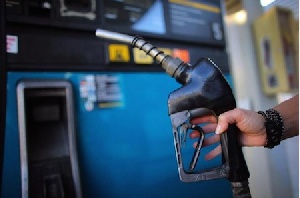- Home - News
- TWI News | TV
- Polls
- Year In Review
- News Archive
- Crime & Punishment
- Politics
- Regional
- Editorial
- Health
- Ghanaians Abroad
- Tabloid
- Africa
- Religion
- Election 2020
- Coronavirus
- News Videos | TV
- Photo Archives
- News Headlines
- Press Release
Business News of Tuesday, 19 January 2016
Source: B&FT
Economist defends fuel taxes
A Senior Lecturer and Chartered Economist at the University of Cape Coast, Dr. John Gartchie Gatsi, has said that the recent taxes government has slapped on petroleum products are a move in the right direction as they will help offset some of the shocks occasioned by the slump in crude oil prices.
While government has benchmarked the price of crude at US$53 per barrel for 2016, prices of crude on the world market have consistently declined, with the price of Brent crude falling below US$28 a barrel in Asia on Monday for the first time in more than 12 years.
This comes on the back of fears of an increasing supply glut after Western sanctions on Iran were lifted, allowing Tehran to resume oil exports.
This situation, Dr. Gatsi thinks, led government to put levies on petroleum products in order to offset some of the deficits incurred as a result of shortage in revenue for developmental projects slated to be carried out with oil revenue.
“The Finance Minister indicated in the 2016 budget that the petroleum benchmark price was to be US$53 per barrel, but as at today the price of oil has slumped to below US$30 per barrel -- and this will bring a lot of distortion to the economy. This is because most of our projects including debt repayment are financed by petroleum revenue,” he told the B&FT in an interview.
“That is why as managers of the economy they needed to take advantage of the reduction in price of the downstream in order to offset or close some of the gap in the upstream, hence the levy on petroleum products,” he said.
He added that the situation makes economic sense when viewed from a managerial perspective, and called on government to explain matters clearly for the citizenry to better accept the situation as it will accrue to the country’s benefit in the long-term.
“This happens in many business settings a lot of times. Sometimes a branch may not be performing very well, but you keep those branches and use revenue from others to help the non-performing one -- and that is what we are seeing in the country now. The levy on petroleum is to take advantage of gains in the downstream to offset some of the losses in the upstream.
“Unfortunately, many people are looking at it from a political and a linear point of view by thinking because of the slump in global oil prices there must also be a reduction in fuel prices at the downstream. But from a managerial point of view, it is an appropriate decision taken by government so that it can raise revenue to undertake all the projects that should be financed by oil money, which will benefit the people in the long-term,” Dr. Gatsi said.
It is expected that government runs the risk of losing close to US$200million (approximately GHC800million) after using US$53.02 as price per barrel for its benchmark price this year. Government estimated it will receive more than US$500million, or approximately GH¢2billion, from petroleum revenues.
A similar situation last year caused government to cut its revenue expectation as the price of crude oil fell by more than 50 percent. The revenue expectation was cut from GHC4.2billion (3.1 percent of GDP) to GHC1.5billion (1.1 percent of GDP).
Government had to make a withdrawal of more than GHC480million from the Ghana Stabilisation Fund to shore-up its budget as the fall in price of crude oil took full effect on government revenues.











